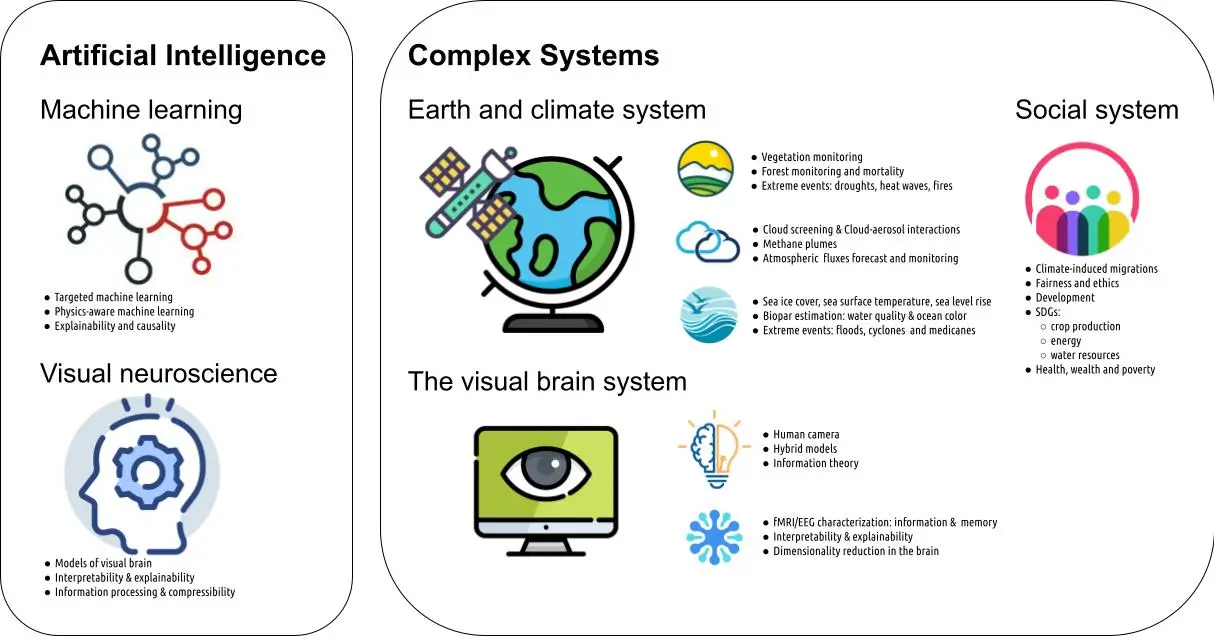AI4CS - AI for complex systems: Brain, Earth, Climate, Society
Keywords: Artificial intelligence, Machine learning, causal inference, graphical models, environment, climate change, remote sensing, Earth science, Climate science, Social sciences.
Our vision in AI4CS is to develop novel artificial intelligence methods to model and understand com- plex systems, and more specifically the visual brain, Earth and climate systems and the biosphere- anthroposphere interactions. A perfect storm is over us: (i) an ever increasing amount of observational and sensory data, (ii) improved high resolution yet mechanistic models are available, and (iii) advanced ma- chine learning techniques able to extract patterns and identify drivers from data. In the last decade, machine learning models have helped to monitor, predict and forecast all kind of variables and parameters of interest from observational data. They help in quantifying visual stimuli, to monitor land, oceans, and the atmosphere, as well as to study socio-economic variables at different scales and spheres. Current approaches, however, face three important challenges: (1) they cannot deal efficiently with the particular characteristics of data, (2) they do not respect the most elementary laws of physics, and (3) they just interpolate but nothing fundamental is learned from data.

In AI4CS we tackle these three problems by designing algorithms able to deal with huge amounts of com- plex, heterogeneous, multisource, and structured data. Firstly, a new generation of targeted AI methods to improve efficiency, prediction accuracy, and uncertainty quantification and error propagation. Secondly, we push the boundaries of a new family of hybrid physics-aware machine learning models that encode physical knowledge about the problem, constraints, inductive biases and domain knowledge, with the goal of attain- ing self-explanatory models learned from empirical data. Finally, the project deals with learning graphical causal models to explain the potentially complex interactions between key observed variables, and discover hidden essential drivers and confounding factors. The AI4CS project vision thus seizes the fundamental prob- lem of moving from correlation to dependence and then to causation through data analysis. The theoretical developments are guided by the inherent ventures of modeling and understanding complex systems at different spatio-temporal resolutions, spheres and interactions.
The long-term vision of AI4CS is tied to open new frontiers and foster research towards algorithms capable of discovering knowledge from data, a stepping stone before the more ambitious far-end goal of machine reasoning in complex systems science. AI4CS is a unified AI research agenda for complex systems, steering modeling and understanding complex systems with advanced AI, from targeted, robust, trustworthy and physics-aware machine learning, with the more ambitious goal of advancing in model interpretability and causality.
The researchers teamed up in AI4CS are led by the Image and Signal Processing (ISP) group at the Universitat de València, and several outstanding researchers join from different institutions to collaborate actively together. The AI4CS research team is formed by 13 senior researchers (42 six-year research periods), and very active (average h = 36). In addition, the ISP includes the help of 5 assistant professors that support key research activities. The team has received funding from the EU excellence pillars in the last years: (1) four ERC grants (consolidator, synergy and proof-of-concept) related to geosciences, visual neuroscience and cli- mate modeling with AI, (2) seven H2020 projects for the development of AI both theoretically and with Earth, vision and societal applications, and (3) are involved in 6 MINECO projects in the intersection of remote sens- ing, Earth and vision sciences. The group is also very active in technology transfer internationally, with projects in collaboration with ESA, NASA, EUMETSAT, Google and Davalor Salud. The group is compromised with higher-level education: ISP lectures in several endorsed masters, participates in COST actions, coordinates activities in an ELLIS research program, and is a core member of ELISE and i-AIDA for the excellence of AI science, transfer and education in Europe. We contribute to knowledge transfer, as well as to the development and adoption of AI in the industry and private sectors.

The research of the team is recognized worldwide and at a national level, but not regionally yet. The ISP has an excellent track-record, is young, internationally visible, active and productive, but still gender unbalanced and with two relevant areas that need consolidation and support. PROMETEO is the right framework to address these deficiencies, and consolidate our team and AI4CS research as part of the Comunitat Valenciana pole of AI research.